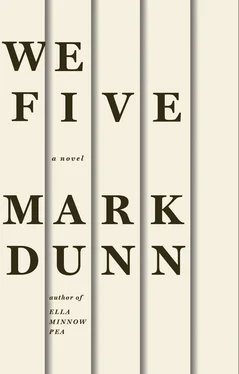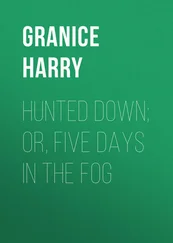Ruth, having already taken charge of matters, was in medias res with the other two: “The next ferry to Oakland isn’t until early tomorrow morning. Molly, you and Jane and Lyle will need a place that isn’t far from the Ferry Building where you can spend the night. If you hide yourselves well enough, you stand a good chance of getting Lyle on the boat without being seen and followed.”
“You might as well come with us, Ruth,” said Maggie. “You’re already packed and you already have your ticket for New York.”
“That leaves Carrie,” said Jane. “What are you going to do with yourself, Carrie?”
“I’ve been giving it a lot of thought. There’s a music school I’ve been looking into. It’s in New York.”
Ruth corrugated her brows with interest. “Are you saying you’d like to come with me , Carrie?”
“There’s nothing keeping me here in San Francisco. Especially with all of you leaving. Yes, I’d like to come with you, Ruth. I have money in the bank. I didn’t put it in my mattress like some do. I put it in a savings account. I’ll just withdraw it all tomorrow morning and then you and I can be on our way. If, that is, you’ll have me.”
“Why shouldn’t I have you, Carrie? You seldom get under my skin the way our three sisters do.”
Ruth’s attempt at dry levity went unacknowledged.
Carrie looked at Lyle. “I think, then, I will take that picture from you, Lyle. Because I don’t know when I’m ever to see you again.”
Lyle tore the sketch from the book. There was a shyness, an awkwardness about him that seemed out of character. But then again, there was very little Lyle Higgins had said or done over the course of the last two or three days that seemed in character. He handed the sketch to Carrie.
She looked at it with the loving eyes that her present discomfiture would not permit her to raise up. “I always wanted to live in this little village. I’ll look at it and think of you, Lyle.”
Lyle swallowed nervously. He glanced up at the ceiling as if he might wish to climb right back up into the crawlspace to escape his present unwonted unease.
Ruth looked back and forth between the two of them, half smiling with curiosity. “How did I happen to miss the first act of this little play?”
“You didn’t miss anything at all,” chuckled Jane. “It feels to me as if the curtain has just begun to rise.”
What was also rising at that moment was the color in both Lyle and Carrie’s cheeks.
“So just where will we be staying tonight?” asked Maggie, returning the discussion to more practical matters. “Holborne knows where each of us lives. Miss Colthurst gave all our personal information to the Katz Agency.”
“I’d like to make a suggestion,” said Ruth. “You may not like it, but then again, it’s not a place Holborne or any officer of the San Francisco Police Department would be likely to go. Cain took me there. It’s in Chinatown. We can sleep there. They have little rooms.”
Carrie frowned and then ventured nervously, “This place, Ruth: it isn’t an opium den , is it?”
“As a matter of fact it is an opium den. Among other things. But you needn’t worry. The opium eaters will be far too torpid to give us much trouble. And as for any lurking white slavers, we’ll have Lyle to protect us.”
In spite of the reactive gapes and shudders which followed Ruth’s proposal, not a single one of its recipients spoke up in opposition to it. It was, after all, the most reasonable choice from a menu of severely limited options. And the tearoom on Dupont Street was very convenient to their purposes; it was only eight short blocks from the Ferry Building on the Embarcadero.
They would spend the night tucked away in the heart, or, if one wishes a less benign description, the viscera , of Chinatown, and then Molly and Maggie and Lyle and Jane would rise early and catch the first morning ferry to cross the bay.
And if Ruth were lucky, the tearoom’s kitchen would remain open late into the night. Because upon her previous visit to this place with Cain, she’d discovered that she had quite a taste for authentic Chinese cuisine.
___________
All of We Six had been to Chinatown before, but excepting Ruth’s luncheon there with Cain, there hadn’t been a visit since the Plague. Now, as they climbed Dupont with halting steps and wide-eyed gazes, each appearing equally exotic to the neighborhood’s denizens due to their unfamiliar Caucasian countenances and their strange Occidental garb, they felt as if they’d just disembarked into a place out of time and ken. The street was chockablock with crowded structures whose original architectural purpose had been shanghaied by the necessity of reduction and compartmentalization into smaller and smaller spaces. The side streets were dark narrow alleys with opened doors that afforded smoke-clouded glimpses into rooms congested with men crouched over fantan tables. There were staircases that went up and those that went down, and every block was overhung with a plethora of balconies and logia, which to the squinted eye might remind one of a street in Venice.
The fully dilated eye was confronted by colors of every shade and hue: in the bright iridescence of the clothing; the green and yellow and sky-blue and vermilion of the richly painted walls; the gold which outlined the cornices and eaves and window trimmings; and the variegation of intense color to be found in the signs bearing bold but inscrutable Chinese logograms. There were red and gold lanterns hanging from every ceiling and assemblages of fat cobalt-blue pots of red saffron and pink tulips. Some of the buildings were dilapidated and crumbling beneath their decorative ornamentation, like old women with youthful souls.
Molly nudged Maggie to note a little pigtailed man in an orange Mandarin jacket. She wanted to say that this was the same jacket she’d seen their friend Mirabella Prowse wear a couple of weeks earlier. But Molly wouldn’t even attempt to voice the observation, for she knew she wouldn’t have been heard. The air was too full of the clamor and clatter of too many people in too small a place, all hailing and railing and singsonging and wheeling and trundling their carted wares, seemingly oblivious to the inconvenience of their crowded circumstances.
Maggie, who had a sensitive nose, pinched both nostrils. There were pungent wafts in the air of fresh-caught Pacific crayfish and squid and flounders and sole, the rank odor of fast-ripening produce, the strong aromas of sandalwood and smoldering punk and exotic dishes being prepared in upper rooms and vented out into the street.
“Here we are,” announced Ruth. “Up these stairs.”
“Has it a name?” shouted Jane over the din.
“Places like this don’t have a name.”
“Oh God,” said Maggie and Molly at the very same time. Yet Carrie, for once, didn’t seem worried at all. Lyle was holding her hand.
Zenith, Winnemac, July 1923
Sister Abigail Dowell looked her five newly appeared choir members up and down disapprovingly. She reserved her frostiest glare for the male interloper who stood among them. “Sister Lydia isn’t going to like this.”
“Isn’t going to like what ?” asked that very referent, stepping out of her private office accompanied by her choir director, Sister Vivian.
“Well, everything, ” replied Sister Vivian’s assistant. “They’ve missed the last two choir rehearsals and we’ve got full dress at six o’clock.”
Sister Lydia rolled her eyes. “I know we’ve got full dress at six, Abigail. I’m the one who scheduled it.”
Читать дальше












